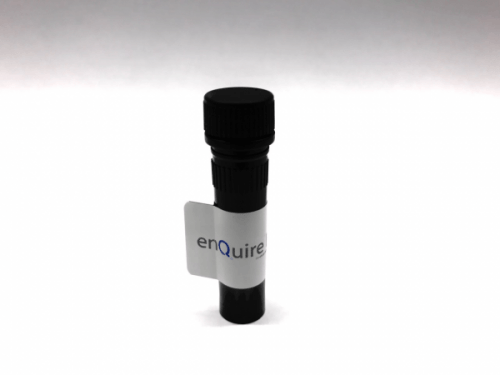Mouse Anti-Anti-CD273 Antibody Product Attributes
Species: Mouse
Tested Applications: Flow Cytometry, Immunohistochemistry (IHC), immunofluorescence, immunoprecipitation, Western Blot.
Application Notes: See Product Datasheet for Recommended Dilution Range. Requires Experimental Optimization
Clonality: Monoclonal Antibody
Anti-Anti-CD273 Antibody Clone: TY25
Clone TY25 Host and Isotype: Rat IgG2a kappa
Buffer and Stabilizer: 10 mM NaH2PO4, 150 mM NaCl, 0.09% NaN3, pH 7.2
Antibody Concentration: 0.5 mg/mL
Storage Conditions: 2-8C protected from light. Stable for 12 Months. Do Not Freeze.
Anti-CD273 Previously Observed Antibody Staining Patterns
Observed Subcellular, Organelle Specific Staining Data:
Anti-PDCD1LG2 antibody staining is expected to be primarily localized to the cytosol.
| Anti-CD273 General Information | |
|---|---|
| Alternate Names | |
| B7-DC, PD-L2, CD273, PDL2, B7DC, PDCD1L2, Btdc, CD273, PD-L2, bA574F11.2 | |
| Curated Database and Bioinformatic Data | |
| Entrez Gene ID | 58205 |
| Ensemble Gene ID | ENSMUSG00000016498 |
| RefSeq Protein Accession(s) | NP_067371 |
| RefSeq mRNA Accession(s) | NM_021396 |
| RefSeq Genomic Accession(s) | NC_000085 |
| UniProt ID(s) | Q3U304, Q9WUL5 |
| UniGene ID(s) | Q3U304, Q9WUL5 |
| Cosmic ID(s) | Pdcd1lg2 |
| KEGG Gene ID(s) | mmu:58205 |
| General Description of Anti-CD273. | |
| The TY25 antibody is specific for mouse CD273, more commonly known as PD-L2 or B7-DC, a 25 kDa protein which acts as a ligand for the T cell co-regulatory receptor PD-1 (CD279). This interaction modulates T cell antigen receptor (TCR) signaling and therefore T cell activation. PD-L2 binding to PD-1 expressed on CD4-CD8- thymocytes participates in the processes of clonal selection, elimination of autoreactive lymphocytes, and development of tolerance. PD-L2 may also bind PD-1 following the receptors inducible expression on activated, mature T cells, where it has been proposed to limit T cell activation. PD-L2 is one of a group of B7 ligands whose interactions with the CD28 receptor family, also including CTLA-4 (CD152), provide a balance of co-stimulatory /co-inhibitory signaling important in T cell activation, tolerance, and autoimmunity.The TY25 antibody may be used as a marker for PD-L2 expression in mouse, primarily on monocytes, macrophages and subsets of dendritic cells. The antibody is also widely used for analysis of receptor-ligand interaction and function(s) in vitro and in vivo. Please choose the appropriate format for each application. | |
Selected References
Hams E, McCarron MJ, Amu S, Yagita H, Azuma M, Chen L, and Fallon PG. 2011. J. Immunol. 186:5648-5655. (in vivo blocking)Shen L, Lin Y, Freeman GJ, Sharpe AH, and Dana MR. 2007. J. Immunol. 179:3672-3679. (Immunohistochemistry – OCT embedded frozen tissue; Flow cytometry)Schoop R, Wahl P, Le Hir M, Heemann U, Wang M, and Wuthrich RP. 2004. Nephrol. Dial. Transplant. 19: 2713-2720. (Immunofluorescence microscopy – frozen tissue)Ansari MJI, Salama AD, Chitnis T, Smith RN, Yagita H, Akiba H, Yamazaki T, Azuma M, Isai H, Khoury SJ, Auchincloss H, and Sayegh MH. 2003. J. Exp. Med. 198:63-71. (in vivo blocking, Immunohistochemistry – frozen tissue)Yamazaki T, Akiba H, Iwai H, Matsuda H, Aoki M, Tanno Y, Shin T, Tsuchiya H, Pardoll DM, Okumura K, Azuma M, and Yagita H. 2002. J. Immunol. 169: 5538-5545. (Immunoprecipitation, Western Blot)
Limitations and Warranty
enQuire Bio’s Mouse Anti-CD273/PD-L2 Monoclonal is available for Research Use Only. This antibody is guaranteed to work for a period of two years when properly stored.




There are no reviews yet.